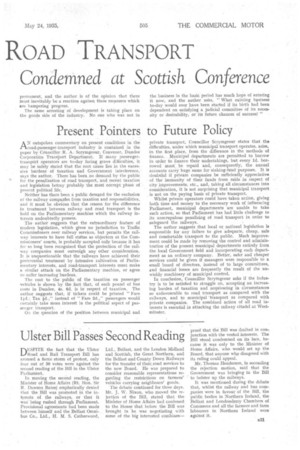Present Pointers to Future Policy
Page 49

If you've noticed an error in this article please click here to report it so we can fix it.
AN outspoken commentary on present conditions in the road-passenger-transport industry is contained in the paper by Councillor.R..A. Scrymgeour, Convener, Dundee Corporation Transport Department. If many passengertransport operators are to-day facing grave difficulties, it may be safely stated that the root cause lies in the excessive burdens of taxation and Government interference,' says the author. There has been no demand by the public for the penalization of road transport, and recent taxation and legislation betray probably the most corrupt phase of present political life.
Neither has there been a public demand for the exclusion of the railway companies from taxation and responsibilities, and it must be obvious that the reason for the difference in treatment between railway and road transport is the hold on the Parliamentary machine which the railway interests undoubtedly possess.
The author suggests that the extraordinary feature of modern legislation, which gives no jurisdiction to Traffic Commissioners over railway services, but permits the railway interests to have full status as objectors at the Commissioners' courts, is probably accepted only because it has for so long been recognized that the protection of the railway companies must outweigh any other consideration. It is unquestionable that the railways have achieved their preferential treatment by intensive cultivation of Parliamentary interests, and road-transport interests must make a similar attack on the Parliamentary machine, or agree to suffer increasing burdens.
The cost to the public of the taxatiOn on passenger vehicles is shown by the fact that, of each pound of bus costs in Dundee, 4s. 6d. is in respect of taxation. The author suggests that, if tickets could be printed " Fare 14d.: Tax instead of " Fare 2c1.," passengers would certainly take more interest in the political aspect of passenger transport.
On the question of the position between municipal and
private transport, Councillor Scrymgeour states that the difficulties, under which municipal transport operates, arise, in the first .place, from the difference in the methods of finance. Municipal departments are permitted to borrow in oyder to finance their undertakings, but every 1d. borrowed must-. be repaid and, consequently, the annual accounts carry huge sums for 'sinking-fund purposes. It is doubtful if private companies be sufficiently appreciative of the immunity of their funds from raids in respect of city improvements, etc., and, taking all circumstances into consideration, it is not surprising that municipal transport is not on the paying basis of private transport.
Whilst private operators could have taken action, giving both time and money to the necessary work of influencing Parliament, municipal departments are unable to take such action, so that Parliament has had little challenge to its unscrupulous penalizing of road transport in order to safeguard the railways.
The author suggests that local or national legislation is responsible for any failure to give adequate, cheap, safe and comfortable transport to the public. Much improvement could be made by removing the control and administration of the pre.sent municipal departments entirely from the local Government field and incorporating each department as an ordinary company. Better, safer and cheaper services could be given if managers were responsible to a small board of directors, instead of to large committees, and financial losses are frequently the result of the unwieldy machinery of municipal control. In conclusion, Councillor Scryingeour asks if the industry is to be satisfied to struggle on, accepting an increasing burden of taxation and acquiescing in circumstances so unfavourable to road transport as compared with the railways, and to municipal 'transport as compared with private companies. The combined action of all road interests is essential in attacking the railway citadel at Westminster.




































































































